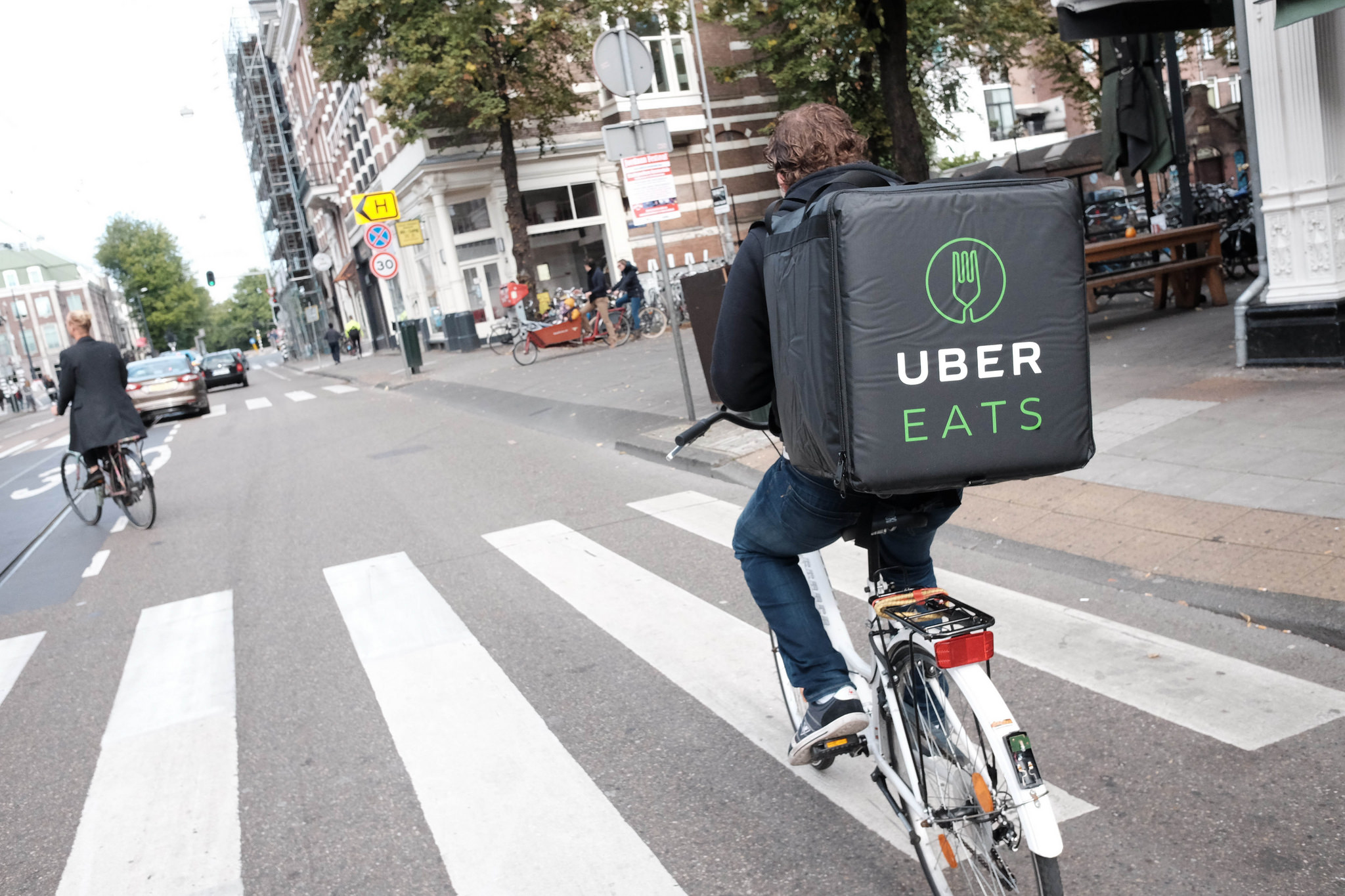Uber Eats couriers in Europe to be offered free accident and sickness insurance

Uber has announced it’s launching a free insurance package for independent couriers delivering food for its Uber Eats business in nine European markets.
It says all couriers with an active account in the covered markets will be able to take up the product free of charge.
The plan will be introduced from January 8, 2018, and will include personal accident insurance during a delivery trip; a cash benefit for severe sickness or injury up to a maximum of 15 days; and third party liability cover up to a maximum of €1M.
The ride-hailing giant has partnered with AXA Corporate Solutions for the bespoke insurance product — which it says will provide “additional protection and security” for couriers delivering for its Uber Eats service in Austria, Belgium, Italy, the Netherlands, Poland, Portugal, Spain, Sweden and the UK.
Earlier this year, in April, Uber launched a subsidized personal injury and illness insurance for drivers in the UK — though that product was not entirely free of charge, costing drivers who were eligible £2 per week to join the scheme.
Food delivery couriers that are working busy roads on bicycles and mopeds are visibly taking the biggest risks to their personal safety — which likely explains why Uber is fully subsidizing the Uber Eats insurance package.
Uber and other gig economy companies have also faced growing pressure in Europe over employment conditions and rights for the individuals providing the core services offered by their platforms as legal challenges have successfully unpicked multiple ‘self-employed’ classifications.
In October last year a UK employment tribunal ruled that a group of Uber drivers had worker status — meaning they are entitled to workers rights such as holiday pay, paid rest breaks and the National Minimum Wage.
Last month Uber lost its first appeal against that judgement, and had an application to take an appeal straight to the UK’s supreme court denied — leaving it the option of going to the UK’s Court of Appeals.
At the same time a decision by Europe’s top court — in a separate case concerning a self-employed window salesman who was determined to have worker status — appears to have raised the stakes considerably because it did not time-limit potential claims for backpay at all. Meaning that across the EU, over the longer term, the financial incentive for employers to deny entitlement to holiday pay will be reduced — given the risk if they get a classification wrong can mean having to pay out for an entire, multi-years employment term.
Meanwhile, in the UK, the government has been looking at whether it needs to change employment law to take account of modern working practices, such as app-enabled gig economy jobbing.
The government commissioned an independent review of modern working practices, which was published in July, and included recommendations such as creating a new classification for workers on tech platforms to separate them from what it dubbed the “legitimately self-employed”.
Though it’s still not yet clear which of the review’s recommendations it might act on.
In October a UK parliamentary committee questioned representatives from Uber and Deliveroo — including quizzing the companies on sick pay and whether they are always paying the national minimum wage.
Uber told the UK committee that should it have to fund workers rights for all circa 50,000 self-employed drivers on its platform in the UK it would cost the business “tens of millions” of pounds.
Given all this legal and political noise around gig economy rights, Uber’s moves in Europe to begin offering insurance products appear geared towards trying to shrink its liabilities as well as ease political pressure and steer off the risk of a major regulatory clampdown that could enforce rights across the board for gig economy workers.
The Uber Eats courier insurance package is one of several initiatives between Uber and AXA, according to the company.
Uber also claims it’s “the first of its kind to provide protection across multiple countries”.
In the event of an accident it says the courier will “simply have to fill in an online claim form available via the Uber Eats app”.
Here’s the full breakdown of the benefits offered by the package:
Personal accident during an Uber Eats trip
- Reimbursement for medical expenses from an accident that results in hospitalization (hospital costs and also all the related consultation costs, pharmaceutical costs, X-rays and medical tests up to €7,500).
- If the hospitalization is of 3 consecutive nights (72 hours) or more, a lump sum payment of €3,000 will be made.
- In case of permanent total disability, a lump sum payment will be made of €30,000.
- In case of accidental death, a lump sum payment will be made to the beneficiary of €30,000 as well as reimbursing up to €3,000 for costs relating to funeral expenses.
Cash benefit for severe sickness or injury
- If an active Uber Eats courier suffers from any severe sickness or injury leading to hospitalization of more than 3 consecutive days (72 hours), the courier will receive €50 for each day they are confirmed medically unable to work (up to a maximum of 15 days).
Third party cover during an Uber Eats trip
- Coverage for any legal liabilities for bicycle (or pedestrian) couriers relating to third party bodily injuries and third party property damage up to a maximum of €1,000,000.
Commenting in a statement, Filip Nuytemans, Uber Eats general manager for Europe, said: “Uber Eats couriers can now enjoy the freedom and flexibility of working on their own schedule with the peace of mind provided by additional security and protection.
“This is a reflection of our commitment to invest in solutions that meet the everyday needs and concerns of couriers who want to partner with Uber Eats to earn some extra money.”
In another supporting statement, Rob Brown, CEO of AXA Corporate Solutions, flagged up what he described as growing complexity in business environments, including “profound changes are brought in by the digital revolution”, adding that Axa’s goal is to “support changes by offering appropriate solutions that meet the changing needs of the workforce”.
At the same time, ‘insurtech’ startups such as Zego are spying a similar opportunity. In its case it’s currently providing vehicle insurance cover for gig economy workers on a pay-as-you-go basis.
It closed a £6M Series A in November, led by Balderton.
Featured Image: Franklin Heijnen/Flickr UNDER A CC BY-SA 2.0 LICENSE
Published at Fri, 15 Dec 2017 11:19:33 +0000





